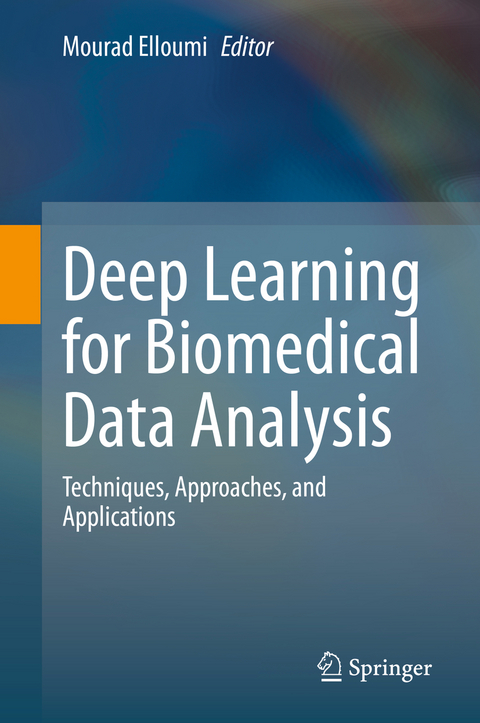
Deep Learning for Biomedical Data Analysis
Springer International Publishing (Verlag)
978-3-030-71675-2 (ISBN)
The reader will require some familiarity with AI, ML and DL and will learn about techniques and approaches that deal with the most important and/or the newest topics encountered in the field of DL for biomedical data analysis. He/she will discover both the fundamentals behind DL techniques and approaches, and their applications on biomedical data. This book can also serve as a reference book for graduate courses in Bioinformatics, AI, ML and DL. The book aims not only at professional researchers and practitioners but also graduate students, senior undergraduate students and young researchers. This book will certainly show the way to new techniques and approaches to make new discoveries.
Mourad Elloumi received an Undergraduate Degree in Mathematics and Physics in 1984, and a Master's Degree in Computer Engineering in 1988, from the Faculty of Sciences of Tunis, Tunisia. He also received a Master's Degree in Computer Science in 1989, and a PhD Degree in Computer Science in 1994, from the University of Aix-Marseilles III, France. Then, he received a Habilitation for conducting research in Computer Science in 2003, from the National School of Computer Science, Tunis, Tunisia. He is currently a Full Professor in Computer Science, Faculty of Computing and Information Technology, The University of Bisha, Saudi Arabia, and Head of the BioInformatics Group (BIG) of the Laboratory of Technologies of Information and Communication and Electrical Engineering (LaTICE), National Higher School of Engineers of Tunis (ENSIT), University of Tunis, Tunisia. Professor Mourad Elloumi is the author/co-author of more than 70 publications in international journals, books and conference proceedings. He was a Guest Editor of a special issue on biological knowledge discovery and data mining, Knowledge Based Systems Journal (Elsevier 2002), a Guest Editor of a special issue on pattern finding in Computational Molecular Biology, Recent Patents on DNA and Gene Sequence Journal (Bentham Science 2012), a Co-Editor of the proceedings of two international conferences and a Co-Editor of four books, respectively, on Algorithms in Computational Molecular Biology (Wiley 2011), Biological Knowledge Discovery (Wiley 2014), Pattern Recognition in Computational Molecular Biology (Wiley 2015), and Algorithms for Next-Generation Sequencing Data (Springer 2017). His research interests are Algorithmics, Computational Molecular Biology, Knowledge Discovery and Data Mining, and Deep Learning.
1-Dimensional Convolution Neural Network Classification Technique for Gene Expression Data.- Classification of Sequences with Deep Artificial Neural Networks: Representation and Architectural Issues.- A Deep Learning Model for MicroRNA-Target Binding.- Recurrent Neural Networks Architectures for Accidental Fall Detection on Wearable Embedded Devices.- Medical Image Retrieval System using Deep Learning Techniques.- Medical Image Fusion using Deep Learning.- Deep Learning for Histopathological Image Analysis.- Innovative Deep Learning Approach for Biomedical Data Instantiation and Visualization.- Convolutional Neural Networks in Advanced Biomedical Imaging Applications.- Deep Learning for Lung Disease Detection from Chest X-Rays Images.- Deep Learning in Multi-Omics Data Integration in Cancer Diagnostic.- Using Deep Learning with Canadian Primary Care Data for Disease Diagnosis.- Brain Tumor Segmentation and Surveillance with Deep Artificial Neural Networks.
| Erscheinungsdatum | 15.07.2021 |
|---|---|
| Zusatzinfo | VI, 359 p. 130 illus., 40 illus. in color. |
| Verlagsort | Cham |
| Sprache | englisch |
| Maße | 155 x 235 mm |
| Gewicht | 671 g |
| Themenwelt | Informatik ► Theorie / Studium ► Künstliche Intelligenz / Robotik |
| Informatik ► Weitere Themen ► Bioinformatik | |
| Medizin / Pharmazie ► Studium | |
| Schlagworte | Artificial Intelligence (AI) • biomedical data analysis • biomedical image analysis • biomedicine • Deep Learning (DL) • Image Analysis • Machine Learning (ML) • Medical diagnostics |
| ISBN-10 | 3-030-71675-9 / 3030716759 |
| ISBN-13 | 978-3-030-71675-2 / 9783030716752 |
| Zustand | Neuware |
| Haben Sie eine Frage zum Produkt? |
aus dem Bereich


